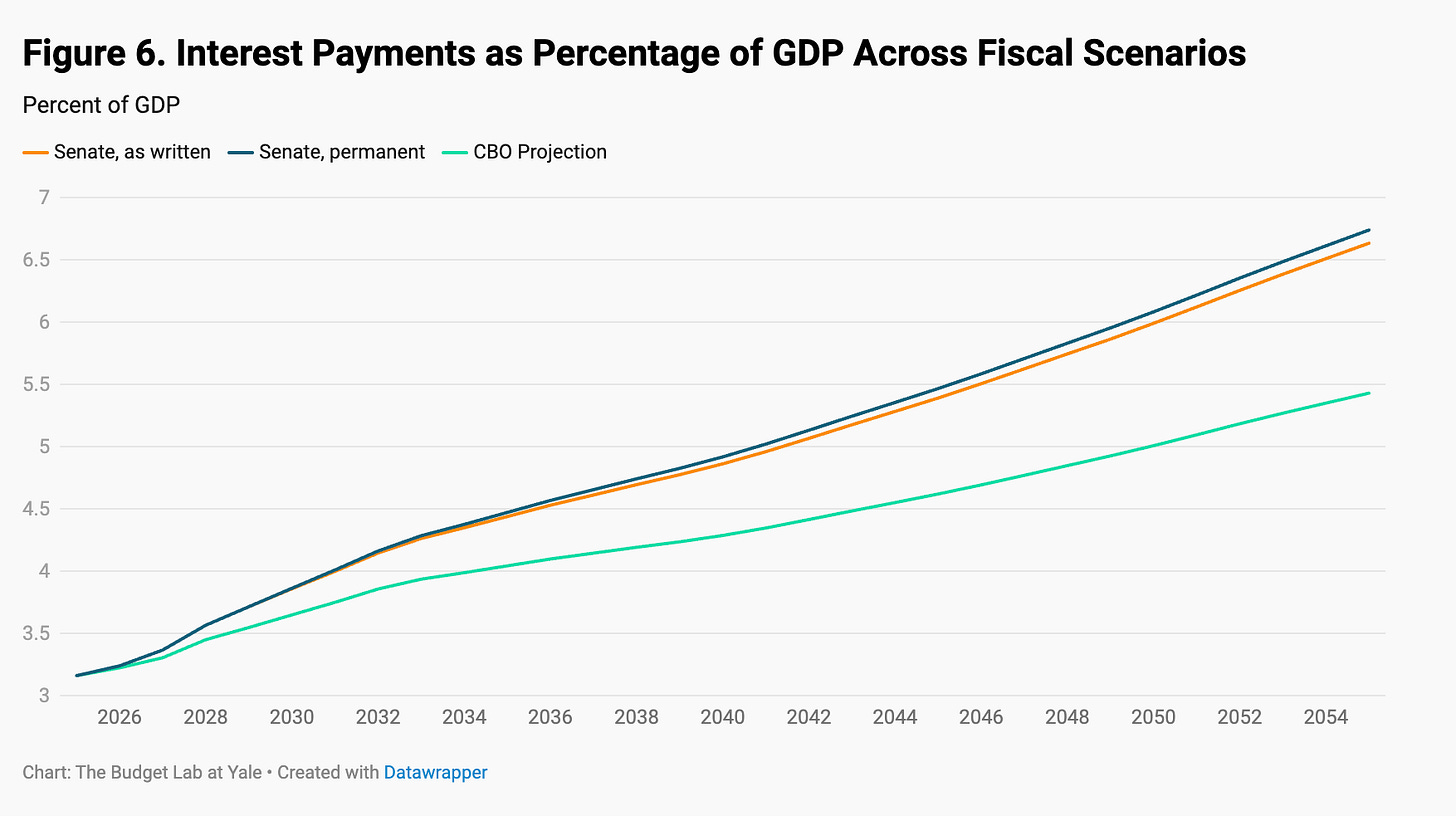As the Republican “Big Beautiful Bill” passed another threshold via Senate reconciliation over the weekend, I want to step back to make sense about what is portends for the future of America.
It would be wrong to characterize the BBB a tax cut bill. It is, effectively, the domestic policy bill for the second Trump regime. Tax cuts were the only major piece of pre-pandemic policy Trump was able to pass in his first term, and he realizes that his other policies are broadly unpopular and will not stand on their own terms. So they are all being shoved in together into a massive piece of legislation that would fundamentally change America, and pushed as quickly as possible before the public fully understands what is in there.
So much is in the bill that it becomes bewildering to make sense of it. I cannot pretend to have a full grasp of every policy domain. But the outlines are clear enough, and will fundamentally make America a more unequal, crueler country, where the government uses unprecedented force to monitor, brutalize and detain its residents, and administrative burden to deny the poorest a hand up. It is a budget that seems to have given up on any long-term vision of investing in America’s people and it’s future.
An Assault on the Poor to Benefit the Richest
One very simple way to make sense of the bill is to look at which income categories win and lose in terms of flow of resources. Here, the pattern is clear: the rich do better *at the expense* of the poor.
As Emily Badger, Alicia Parlapiano, and Margot-Danger Katz point out this is unusual in a couple of ways.
First, prior tax cuts made the rich richer, but the poor also benefited to a smaller degree, or perhaps not at all. But with Trump’s bill, the poor are made worse off. This makes it perfectly fair to critique the bill as a wealth transfer from the poor to the rich.
Second, it is unusual to cut the social safety net to finance regressive tax transfers. Historically, politicians felt it was a little too unseemly to take people’s basic access to food and healthcare away to make the very rich richer. No more. For the tax cuts to work, our current safety net has to go.
There is no compelling urgent policy need for this. Tax cuts do not pay for themselves. The reality is that the US has become more and more unequal over past few decades. The BBB will just turbocharge a damaging trend. People know they live in an unequal society, though they underestimate how unequal it is.
The cuts to the safety net occur not via direct reductions to the promise of benefits. The Trump wealth transfer is built on administrative burdens: the savings depend on making it harder for eligible claimants to receive benefits for programs like Medicaid and SNAP, which look to receive 20 percent and 18 percent cuts, respectively. This includes work requirements that we know don’t work, restricting the ability of states to use administrative data to verify eligibility, and forcing states to put their citizens through more frequent enrollment processes.
The most recent numbers suggest a $1 trillion cut in Medicaid spending and last-minute rollbacks to the Affordable Care Act and estimates of 16 million losing health coverage. I spoke with John Oliver’s production team shortly before they posted this amazing piece on the connection between administrative burdens and the reconciliation bill.
The tax cut for the wealthy is based on a time tax for the poor. All will have to pay, and some will no longer be able to receive benefits to which they are legally entitled. This is not some unintended effect. This is very clearly how the GOP makes their numbers. They will make government broadly dysfunctional for most Americans in order to hand a tax cut to their largest donors.
An Assault on Freedom
It is not only the rich that benefit. The Trump administration wants to spend much more on the security state. This is not altogether surprising. Both parties are generally willing to increase spending on defense, and homeland security has been a source of increased spending since 9/11. But the BBB is different in both where the money goes and how it will be used. It will make the type of federal use of military force we have seen in LA much more common across America.
Trump wants to direct an extraordinary amount of new money for ICE. The spending is so large that it defies easy understanding. For example, ICE will receive a 365% increase in detention, spending $45 billion. For context, this is more than the combined budget for all 50 state prison systems. The current budget for the federal Bureau of Prisons is just over $8.3 billion. The ICE detention budget is larger than the total budget for USAID used to be. The ICE detention budget increase is larger than cuts in education, or for SNAP in the BBB. It is larger than cuts to NIH, CDC, and cancer research combined. It is on the scale of the type of supplemental budgets that the US passed when engaged in foreign wars.
Here, Aaron Reichlin-Melnick provides some additional comparisons.
All of this occurs amidst ICE engaging in unprecedented round-ups, often featuring masked officials waving automatic weapons at Americans. It comes amidst elected officials being denied entry to ICE locations, or being arrested for raising concerns. The public broadly supports immigration enforcement, but not the more extreme tactics ICE has adopted. They have hardly earned the public trust for such a flow of new tax dollars.
That money hires new ICE officers and creates new ICE camps. It provides the fuel for Trump to fulfill his promise to go after cities run by Democrats, to do what he has done to L.A., with less need to rely on the military. The new funding allows Trump to create a Department of Domestic Military Enforcement.
Whether this make you feel more or less safe depends, I suspect, on your politics and where you live. Residents of L.A. see a landscaper and father of three marines being beaten up and taken away. They see images of an ice cream vendor being disappeared, his cart left behind.
As these violent assaults are not actually targeted toward dangerous people, but long-time residents, people feel less safe.
An Assault on the Future
Trump campaigned on reducing the deficit, and DOGE was premised on the need to cut the deficit. But the new bill will massively increase the deficit. But Trump’s actual policies will blow up the deficit. The Budget Lab at Yale estimated that somewhere like $4 to $4.5 trillion would be added to the deficit by the Senate bill.
It is hard to comprehend how much the bill would massively increase the debt without a visualization, so here is one:
It would also mean a huge chunk of U.S. GDP would be reallocated toward debt servicing.
My priors are that I am more tolerant about deficit spending when it results in investments in human capital that we think will pay for themselves. If we are going to burden people with higher debt in the future, give them the resources to pay it off. This budget does the opposite, removing investments that allow people access to basic life stability so they can prosper, or opportunities such as higher education. It shifts spending away from human capital to unproductive areas (like detention centers) and to give people who have plenty of resources even more.
It is not just the deficit, or human capital investments, or education. According to the New York Times, the bill also seeks to kill off support for alternative energy funding to allow the US and the planet to transition to an environmentally sustainable future. Traditional supports for wind and solar energy have been replaced by taxes on these projects:
“This is how you kill an industry,” said Bob Keefe, executive director of E2, a nonpartisan group of business leaders and investors. “And at a time when electricity prices and demand are soaring.”
Does that sound like hyperbole? Let’s see what a professor of environmental and energy economics at Yale has to say: “I hate to say it, but it would kill [America’s] renewable energy market.” Oh.
There is still time to make your voices heard. The reason they are moving so quickly is because they know the public broadly opposes many of these changes. The hour is late, but not too late.
Contact your U.S. Senator about Trump’s budget bill at the U.S. Capitol switchboard at (202) 224-3121 or visit this website.
This is a guest post from Don Moynihan, author of the Can We Still Govern? Substack. Read the original article here.
















